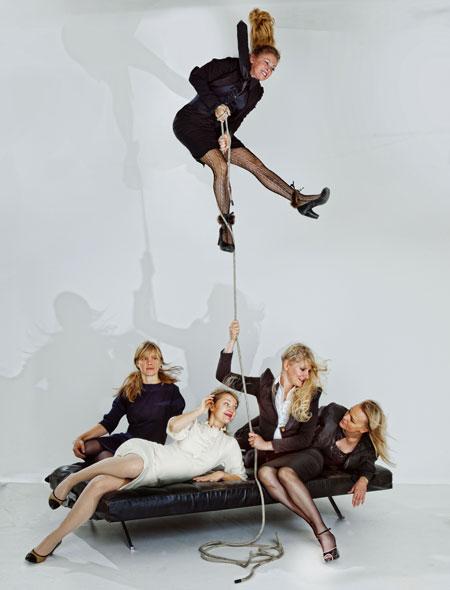A taste of the real thing. That's the motto of Danish Documentary, a company founded in 2007 by three of the most prominent Danish documentary filmmakers. Their initial ambition was to get out their awardwinning films on DVD to international audiences – films like "Enemies of Happiness" (Eva Mulvad), "The Monastery" (Pernille Rose Grønkjær) and "Mechanical Love" (Phie Ambo).
"These are widely different directors who make films in their own individual way, but they help each other out creatively." Producer Sigrid Dyekjær
Soon, Danish Documentary became home to their new productions as well, and the company has quietly been adding new, critically acclaimed films to its catalogue. This year, Eva Mulvad's "The Good Life" and Phie Ambo's "The Home Front" are competing in Amsterdam, and a new film by Pernille Rose Grønkjær is on the way.
No Employees
Shortly after it was founded, Danish Documentary was expanded to embrace the three directors' regular producer, Sigrid Dyekjær, and their fellow filmmaker Mikala Krogh ("Everything is Relative"). Still, the company has no staff. Danish Documentary is simply a framework for the directors' productions: they want to put the money on screen and keep overhead low. Which was always part of the concept of banding together as directors, Phie Ambo says.
"To a director, it can be pretty opaque how the money in a budget is spent. Part of the motivation behind Danish Documentary was to get more control, because we want to put the money into our films, not into administration. In that respect, having our own company has given us focus and peace in our work," Ambo says. She underscores the importance to all four directors of having as skilled a producer as Sigrid Dyekjær working on their projects.
"Obviously, it's essential to have a high-energy producer on your film," she says. "It's my impression that a lot of directors outside Denmark produce their own films. That's absolutely not the concept here. If you have ambitious projects and want production flow in your work, it's crucial to have a skilled producer, so you can focus on the essential things as a director," she says.
Using The Financing Phase Creatively
As Danish Documentary's producer, Dyekjær considers the corporate construction an advantage, both for the films and the company itself, in a time when many other companies have grown too big.
"We do films with big, international ambitions, but that doesn't mean you have to have a big outfit," she says. Moreover, she sees it as a huge strength for the company that all four directors came out of the National Film School.
"These are widely different directors who make films in their own individual way, but they help each other out creatively, and it's productive to be able to draw on long-standing collaborations during processes that very often are both drawn-out and difficult. All four have in common that they approach the world cinematically and develop their highly personal films in a dialogue with a film crew from the outset," Dyekjær says. "Also, we are working a lot to use the financing phase creatively, gauging people's reactions in order for the director to explore which parts of the story are the most important."
As Ambo frankly observes, the financing phase is an aspect of filmmaking that a director has to find ways of turning into an advantage. "We know that we have to raise funds for our films ourselves and we approach financing as a part of the project development," she says. "Often, when we first bring our project to someone, we have already done some shooting and present pilots with footage that will make it into the finished film. Financing is part of the film".

